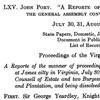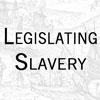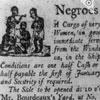Download Transcript: Virginia Landowners
Landowners, particularly those with significant holdings, controlled most of the formal political and economic power in colonial Virginia. Class was an important factor in shaping one’s influence and day-to-day experiences. Gender also played a significant role, especially in regards to the law of coverture.
Married women, under this law, could not own property of their own or make contracts. They were also not allowed to sue or be sued in court. They were “covered” by their husbands’ authority and the two were treated legally as one person. A woman who was widowed, however, could own property and conduct business on her own. Widowed women did not generally inherit property from their husbands, but were entitled to parts of the estate, including slaves.
In this video, George Mason University Professor Rosemarie Zagarri analyzes a 18th-century probate record from the estate of Sarah Green and discusses what it can tell us about colonial landowners and slaves.
Source: Roy Rosenzweig Center for History and New Media, Sarah Green – Owning Slaves (8), Probing the Past: Interpreting Sarah Green (Fairfax, VA, 2011), accessed September 20, 2011. Full video is available at Probing the Past, Probing the Past: Interpreting Sarah Green.












